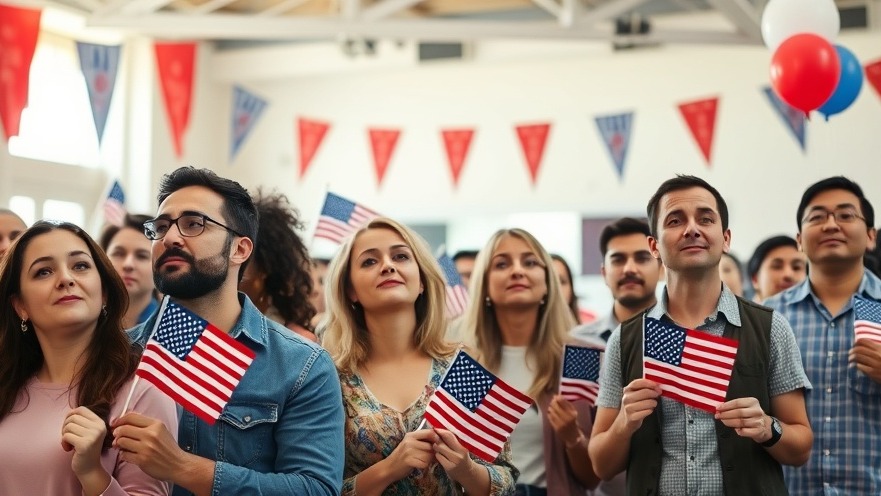
The Increasing Tension Surrounding Refugee Policies in the U.S.
In recent geopolitical discourse, the decision by the United States to grant refugee status to a group of 59 white South Africans has ignited hot debates across various sectors. Initially hailed by some as necessary support for vulnerable communities facing systemic violence, critics have labeled the initiative racially selective and hypocritical—especially in light of ongoing crises in regions like Afghanistan and Sudan. This particular case presents a multifaceted view of race, security, and humanitarianism against the backdrop of U.S. national policy.
In 'U.S. Grants Refugee Status to White South Africans', the discussion dives into the political and humanitarian implications of this action, prompting deeper analysis on its broader effects.
Racial Dynamics in Refugee Admissions
The Trump administration's move has been notably controversial, with critics emphasizing the inconsistency in the refugee admissions process. Many prominent individuals and organizations are raising important points regarding the implications of prioritizing groups based on race while others, such as refugees fleeing war-torn countries, remain sidelined. This juxtaposition reflects a troubling undercurrent within the discourse on race and safety that breeds division and drives a wedge between communities within and outside the United States.
A Closer Look at South African Violence
The response from Khali Kreo, CEO of Afrey Forum, adds another layer to this conversation. He articulately presents the context of growing violence against farmers in South Africa. In his assertion, Kreo emphasizes a narrative of existential threat faced by Afrikaners, painting a picture of a society grappling with internal strife marked by xenophobia and calls for violence against certain cultural groups. The distinction he makes between the general violence in South Africa and the specific targeting of Afrikaners lends credence to his claims, showcasing the complexity of the situation.
Genocide or Statistical Anomaly? A Question of Perception
The characterization of the violence against Afrikaners as genocide raises substantial questions. While Kreo and his supporters cite alarming statistics and anecdotal evidence, critics argue that framing the brutality faced by farmers within South Africa as a systematic genocide is overstated. By emphasizing the horrific methods employed in some crimes, he confronts the reader with a reality that cannot be overlooked. But presenting these facts separately from the wider crime epidemic in South Africa risks misrepresenting the overall narrative, obscuring the plight of various communities grappling with violence.
Political Reactions and Historical Context
The political ramifications of this situation extend beyond South African borders. As President Ramaphosa engages with U.S. authorities, accusations of cowardice against those leaving South Africa for refuge complicate an already sensitive issue. The historical context surrounding the apartheid era adds weight to these discussions, as many perceive the U.S. as complicit in brokering an agreement that allowed for the perpetuation of cultural identities within a new political framework post-1994. If the U.S. reneges on its responsibility, what does that mean for the culture that has emerged from this legacy?
Future Predictions: Navigating a New Era
As the global discourse shifts, it will be highly relevant to monitor how these developments may change refugee admissions based on the geopolitical landscape. With the dynamics of race increasingly shaping refugee narratives, there is a potential for policy changes that could redefine safety and humanitarian assistance. A key question emerges: Will this case set a precedent for how the U.S. approaches refugee admissions in the future, especially concerning racially aligned initiatives?
The Role of Advocacy Groups in Shaping Perception
The Afrey Forum's advocacy has drawn scrutiny, criticized for escalating tensions both internationally and domestically. The need for honest dialogue about South African issues is as crucial as ever—many fear that the tone of this advocacy contributes to oversimplification and division. Robust conversation is vital in addressing the complex realities on the ground without resorting to inflammatory rhetoric.
In light of these complexities, it's clear that questions surrounding refugee admissions cannot simply be classified within racial boundaries. As global citizens, we must confront the nuances of such narratives with a critical eye, using them as opportunities for engagement across divides rather than a catalyst for conflict.
While analyzing the facts surrounding the U.S. refugee provisions for white South Africans, one must acknowledge the interconnectedness of global advocacy and local accountability. The implications of this situation reverberate through both local and international communities, demanding our attention and critical thought.
 Add Row
Add Row  Add
Add 


 Add Row
Add Row  Add
Add 

Write A Comment